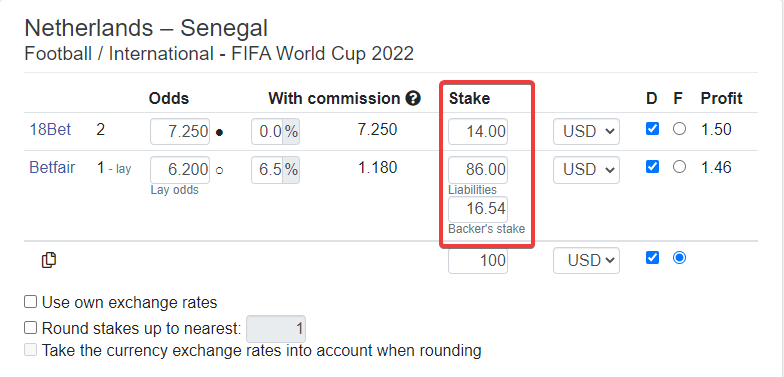Traditional bets that you see on most bookmaker websites are called back bets. This is because you are backing a sport participant by staking your money on their victory.
Lay bets differ from back bets in the following way: a player tries to guess which event will NOT happen. Thus, he/she wins when the chosen outcome does not take place. It is similar to a bookmaker who wins, when the player loses and gives away the stake.
So when you are placing a lay bet, you act like a bookmaker. The odds value will therefore differ. For example, when you bet against the victory of Team 1 with the odds of 1.5, it is as if you have accepted the same bet from another player (a backer). To accept a 100 USD stake, you need to risk your 50 USD which you will need to pay if Team 1 wins. The backer's gain will be 150 USD. These 50 USD that you risk are called liabilities.
If the match ends in a draw or Team 2 wins, you will keep your 50 USD + another player's stake of 100 USD. So the total will be 150 USD. The odds for you will be 150/50 = 3. Thus, when betting against the victory of Team 1 with the odds of 1.5, you are betting on the victory of Team 2 or a draw with the odds of 3.
To convert the value of lay odds into the ordinary value of back odds, you can use the formula:
Back odds = Lay odds / (Lay odds - 1)
And vice versa:
Lay odds = Back odds / (Back odds -1)
In our case it will be:
Odds for X2 = 1.5 / (1.5- 1) = 3
In surebets you might often notice bets marked as "lay" from betting exchanges, e.g. Betfair. Their odds have been converted according to the above-given formula. The back odds are displayed a bit below in a small gray print.

In our calculator you will see separate fields for your liabilities and a backer’s stake. Remember that you risk your liabilities in order to win the backer’s stake (which will then be subject to exchange’s commission).
